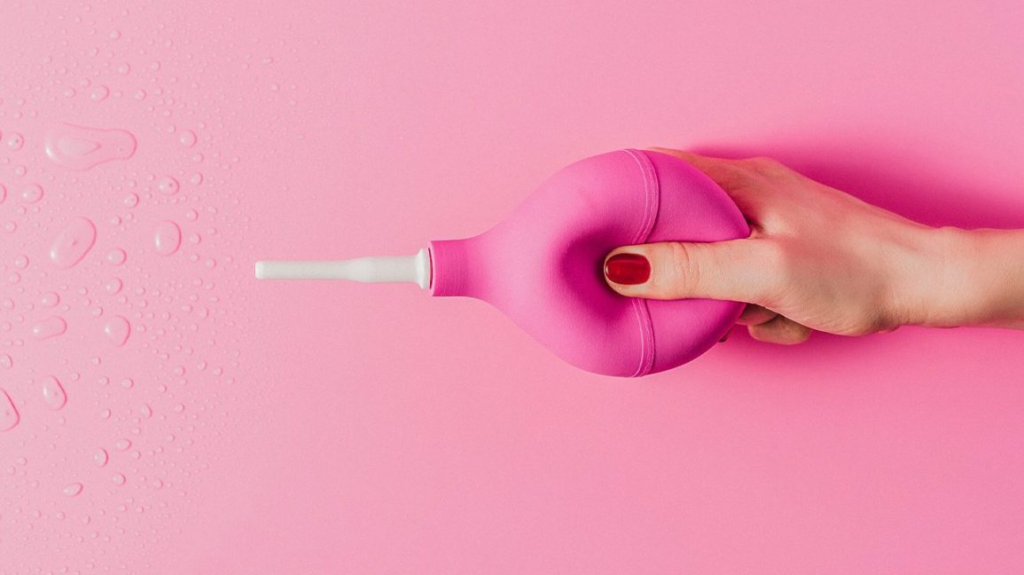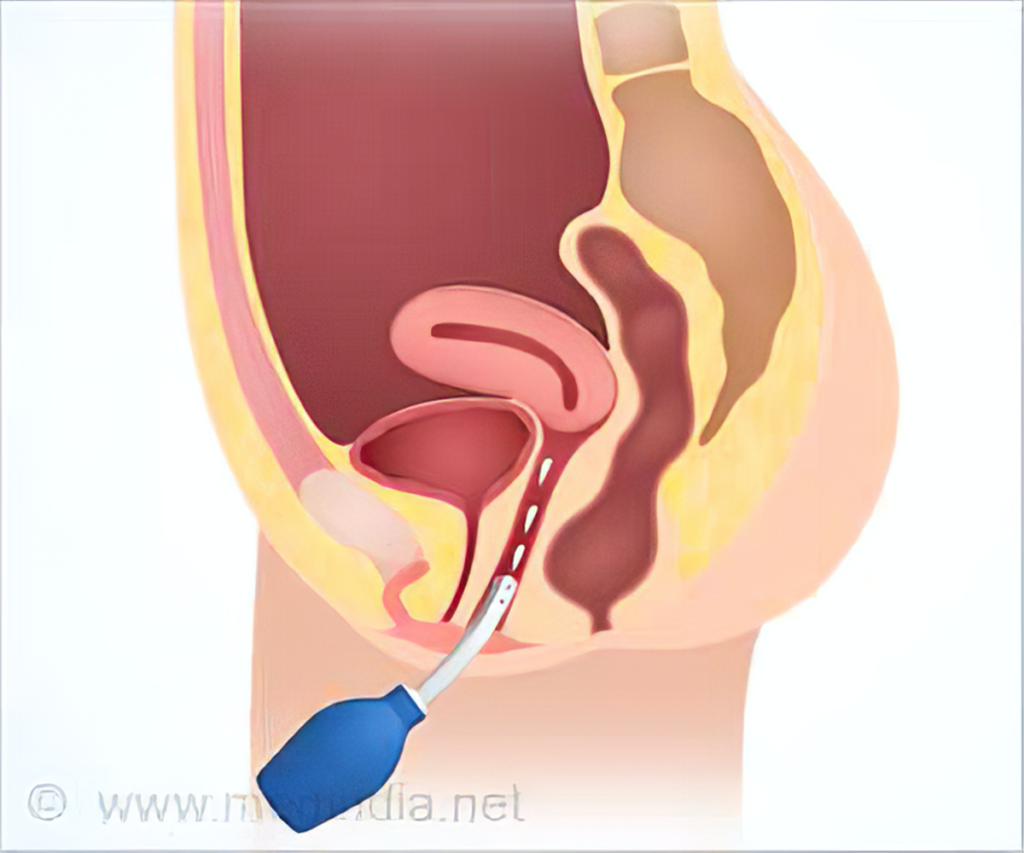
Douching is the practice of flushing out the inside of the vagina with water or a solution that consists of water mixed with vinegar, baking soda, or iodine. Often times the mixture comes in a bottle or bag and is paired with a tube or nozzle that can be used to direct the solution into the vaginal opening. After the mixture is funneled into the vagina, it comes back out the same way, effectively flushing the water and/or solution back out.2
Table of Contents
Douching is Not Recommended by Medical Professionals
Despite the fact that most medical professionals do not recommend douching unless explicitly instructed by your physician, about 20% of women between the ages of 15 and 44 still douche.2 This is due to the fact that there are many myths surrounding douching, and women are not well-informed regarding the potential dangers of this practice.
Douching Usually Has the Opposite of the Intended Effect

Douching presents itself as a way to flush out the vagina in order to clean it and keep it healthy, when in fact it has the opposite effect. Research has shown that douching might do more harm than good. Though there is no direct causal evidence that douching causes infections, many studies have found that women who douched were more likely to contract infections such as pelvic inflammatory disease, bacterial vaginosis, and chlamydia.3
Douching Does Not Clean the Vagina
Many women believe that by using various solutions to flush out the inside of the vagina, they are cleaning it. This belief is false, douching can actually lead to many health issues such as yeast infections, bacterial vaginosis, and pelvic inflammatory disease.2

An important thing to understand is that the vagina is a self-cleaning organ. The vagina creates a natural mucus that it uses to wash away blood, semen, and vaginal discharge.2 It is full of beneficial bacteria called lactobacilli, the same bacteria found in yogurt. These bacteria keep the vagina at a steady pH (acidity) of around 4—the same acidity as lemon juice.1 This acidity is extremely beneficial because it acts a protective barrier against infection and/or irritation.2 Douching can disrupt the natural balance of lactobacilli in the vagina, leading to an increased risk of bacterial infections.1 Douching may also irritate or inflame the skin of the vagina.1
To keep the vagina healthy and clean, it is best to wash the outer part of the vagina with warm water. Mild soaps may be used unless someone has sensitive skin or is currently treating a vaginal infection. It is better to avoid using any scented products such as tampons, pads, powders, sprays and soaps, as chemicals used to create these scents can irritate the vagina.2
Douching Does Not Treat Odor
Certain sources suggest that douching can be used to counteract vaginal “odor.” Some vaginal odor is completely normal and healthy, and that odor may vary in intensity in response to the menstrual cycle. It may also change in response to diet; for example eating foods such as tuna or garlic, or beginning to take new dietary supplements, may influence this smell. In these cases the odor can be reduced by avoiding the consumption of these types of products.4
Extreme and persistent odor can indicate a medical issue, in which case you should contact your doctor immediately. This kind of odor, especially if it is paired with thick or greenish discharge, can point to an infection such as gonorrhea, trichomoniasis, or chlamydia.4 Do not douche prior to seeing a doctor since this can mask symptoms and make it more difficult for a physician to make a diagnosis.2
For women who have already gone through menopause, vaginal odor can be attributed to a lack of estrogen, in which case contacting a physician for treatment options is highly recommended.4
Douching is Not a Reliable Form of Contraception

In some cases, douching is used to imitate the effects of emergency birth control. There is little-to-no evidence that proves this is an effective method, and some research even suggests that douching can actually push sperm further up the vaginal canal.3 Douching should never be used as a form of contraception.2 Douching has, however, been linked to infertility and an increased risk of ectopic pregnancy. An ectopic pregnancy is a potentially life-threatening condition that occurs when the developing fetus grows outside of the uterus. Douching may also make it difficult for a female to become pregnant in the future.5
The best way to prevent pregnancy after sex is the use of an Emergency Contraceptive Pill (ECP) or the insertion of a copper intrauterine device (IUD).
Douching Does Not Prevent or Treat STIs and other Infections
Douching does not prevent the contraction of sexually transmitted infections (STIs) or yeast infections, and it may only cover up the symptoms and cause further health problems. If there is any chance of infection, then douching is not a cure, though it might reduce symptoms temporarily.2

As mentioned previously, the vagina is home to a diverse population of bacteria that work together to create an acidic environment that protects the vagina from irritation and infection. Douching can flush out all this good bacteria. The lack of healthy bacteria leaves the vagina vulnerable to dangers of other bacterial infections. Furthermore if there is harmful bacteria present in the vagina, douching could push the bacteria further up into the uterus, fallopian tubes, and ovaries, and it could cause even greater health issues such as pelvic inflammatory disease.2
If an individual is experiencing any of the following symptoms, they should contact their physician immediately as these symptoms may be indicators of an infection:
- Foul smelling vaginal discharge
- Thick, white, or yellowish-green discharge
- Burning, redness, or swelling in or around the vagina
- Pain during urination
- Discomfort during intercourse
Do not douche prior to an appointment, as it may make it harder for the physician to make a diagnosis.2
Avoid Douching Unless Prescribed by Your Physician
In theory, douching may seem like a safe and helpful method for keeping the vagina clean and healthy, but it is unnecessary and can do more harm than good. The vagina is a self-cleaning organ and its bacterial flora should be left alone. Vaginal odor is very natural and healthy unless it is extremely strong and persistent, in which case a physician should be contacted immediately. Douching does not treat or prevent STIs or yeast infection, nor is it a safe or reliable method of emergency birth control. Douching should only be done at the instruction of a physician.

References
- Boskey, Ph.D. Elizabeth. “Why Women Should Not Douche.” About.Com. N.p., 16 Dec. 2014. Web. 04 Jan. 2015.
- “Douching.” Womenshealth.gov, Office on Women’s Health, U.S. Department of Health and Human Services, 18 Apr. 2017. Web. 25 Jan. 2018.
- Martino, Jenny L., and Sten H. Vermund. “Vaginal Douching: Evidence for Risks or Benefits to Women’s Health | Epidemiologic Reviews | Oxford Academic.” OUP Academic: Epidemiologic Reviews, Johns Hopkins Bloomberg School of Public Health, 1 Dec. 2002.
- Ross, MD Elisa. “Feminine Odor Problems? What Every Woman Needs to Know.” Health Essentials from Cleveland Clinic, Cleveland Clinic, 28 Feb. 2016. Web. 25 Jan. 2018.
- Thompson, Dennis. “Do Women Need to Douche?” EverydayHealth.com. Everyday Health Media, 16 July 2009. Web. 04 Jan. 2015.
Last Updated: 15 February 2018.
